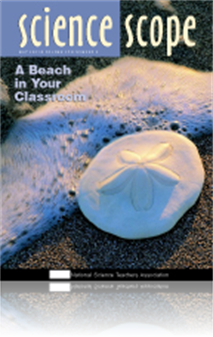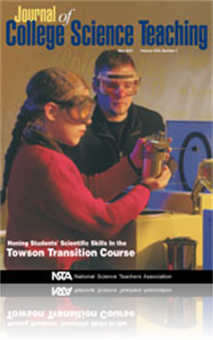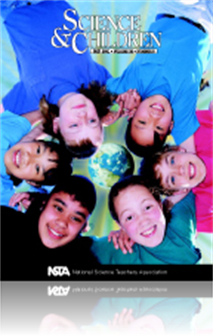All Resources
Journal Article
After the Bell: On the road science
Ask students about summer travel plans, then bring out the classroom globe or world map to find the places they name. You can deepen the texture of students' vacations by exploring the science contexts of their travels. ...
Journal Article
Research and Teaching: Student Attitudes and Recommendations on Active Learning
A freshman student surveyed her peers seeking their opinions, attitudes, and recommendations regarding their experiences in a large, active-learning biology course. The results were mixed—disappointing in some respects but encouraging in others. Se...
Journal Article
While working with classroom teachers, the author developed a “doable” format for inquiry. This format emphasizes using a question wheel as a tool to help students identify independent and dependent variables that drive the underlying structure i...
Journal Article
An In-Depth Exploration of Karst
Exploring the fragile environment of Karst enables students to examine how Earth systems interact over time to create the spectacular landscape features and unique watersheds of Karst regions. It also will help students appreciate how knowledge of Ea...
Journal Article
An opinion piece about grant seeking and the success achieved with projects relying on collaboration and funds from outside the normal school parameters....
Journal Article
Grassroots Environmentalism: Promoting inquiry-based learning through an outdoor education program
Students of the Riverside Military Academy (RMA) came up with the idea of starting a grassroots environmental club and within a year had 50 members. This article explains how they began their focus and misson by becoming members of the Adopt-A-Stream...
Journal Article
Evidence from Apollo: How science teachers can show students that humans have landed on the Moon
Did we really land on the Moon? How do we know? The "conspiracy theory" which says that astronauts did not land on the Moon is largely based on photographic evidence and does not mention the samples brought back from the Moon. This activity examines ...
Journal Article
Customized Internet Assessments
Online assessments, one area of Internet technology that educators are still trying to develop, can involve complicated programming beyond the reach of many instructors. This article describes a program that enables instructors to create their own on...
Journal Article
The author developed a project-based curriculum called the "EnergyNet Energy Audit Project," to teach students about energy. Students look for wasted energy—energy being consumed without benefit to people—in a building and find ways to reduce th...





